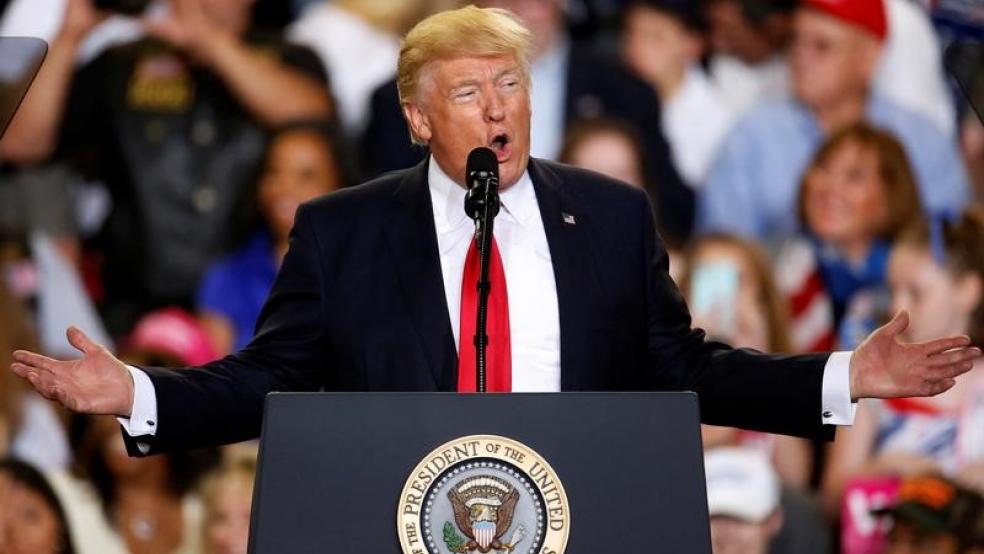Even by the hectic standards of the first few months of Donald Trump’s presidency, the first days of this week have been a virtual hurricane of wild and sometimes conflicting news reports, all generated by the president himself. Relentlessly, the headlines keep coming:
Trump considers a gasoline tax. Trump might break up the big banks. Trump might bring back Depression-era banking regulations. Trump praises a murderous dictator. Trump says he’d be willing to meet with a different murderous dictator. Trump doesn’t understand his own party’s health care bill. Trump wants a stimulus package. Trump wants to eliminate the filibuster. Trump calls for a government shutdown in September.
Related: Trump's Troubling Embrace of Anti-Democratic Leaders and Policies
Bloomberg News, which produced many of Monday’s mini-scoops out of an Oval Office interview with the president, doled them out sequentially like so many shots of espresso. The overall effect was to leave people trying to make sense of it all jittery and exhausted.
That’s because trying to process the Trump presidency as though it’s a normal one is exhausting. Historically, presidents don’t just toss out ideas with huge and far-reaching consequences -- like completely restructuring the financial system, for example -- without a lot of staff work preparing the ground for a major policy announcement.
But Trump does. Almost daily. He lobs out the idea of a new gasoline tax, sending reporters and interest groups scrambling to assess the economic impact such a move would have. How much money would it raise? Could the revenue be dedicated to infrastructure spending? What would the impact be on transportation costs? Would those costs be passed along to consumers? Would the burden of the tax fall disproportionately on the poor?
Then, while everyone is still mulling the possible tradeoffs of a gas tax, his press secretary walks it back.
Related: White House Insists Taxes Can Be Cut While Leaving Medicare Untouched
On Tuesday, Trump picked up his phone and started tweeting. The Senate should change its rules, eliminating the filibuster so the Republicans can pass bills with 51 votes, he said. Then, “Our country needs a good ‘shutdown’ in September to fix mess!”
Less than 24 hours before, in a taped interview with Bloomberg, Trump had said, “Both sides agree, we have to keep government going. We don’t want to shut government.”
There used to be a sort of implicit bargain between the Washington press corps and past occupants of the Oval Office. A president would rarely talk to the press directly. But when he did, the assumption was that he meant what he said and wanted his words to be taken seriously.
In the Trump era, that bargain has been completely reversed. Trump never stops talking or tweeting, but it’s become quite clear that he neither wants nor expects that everything he says will be taken seriously.
Related: Trump Calls Schumer an Incompetent ‘Fool’ Just When He Needs Him Most
The old model of political journalism -- which involves covering a president’s words as though they matter by default -- looks increasingly unsustainable.
The problem isn’t confined to public policy reporters. People outside the political hothouse of Washington, particularly foreign leaders and participants in the financial markets, have now spent months trying to decide whether and how to react to off-the-cuff presidential statements about everything from possible military action to health care policy. Often they react, only to see whatever they were reacting to contradicted soon afterward.
If things keep going like this, the temptation to start ignoring the president when he makes what appears to be major policy statements -- or at least to treat them as only conditionally true until confirmed by actions -- is going to become very strong.
That’s because people can only spend so much time on heightened alert, rushing to battle stations over every presidential utterance only to have to stand down again and again. It’s for that same reason police K-9 handlers occasionally stash fake explosives for bomb detection dogs to uncover. If their constant vigilance isn’t occasionally rewarded, the dogs stop performing at their peak levels.
Related: Trump Gave Democrats a Huge Opportunity, and They’re Blowing It
It’s not helping that major figures in the media are beginning to question whether Trump even understands what he’s saying.
On MSNBC, “Morning Joe” host Joe Scarborough has begun openly speculating about the president’s mental health. Referring to a confusing statement the president made about the Civil War in an interview broadcast Monday, Scarborough, a former Republican congressman, said, “My mother has had dementia for 10 years. That sounds like the sort of thing my mother would say today.”
This is dangerous territory.
As a matter of national security, the president’s words need to carry enough weight to deter enemies and encourage allies. As a matter of economic security, his policy statements need to be delivered clearly and consistently so that businesses know what to expect.
Less than four months into the four years of President Trump’s first term, neither of those things is obviously true anymore.





